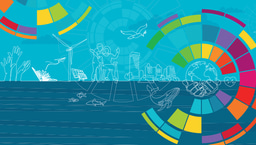How your research shapes policy decisions around the world
Published in Healthcare & Nursing, Astronomy, and Social Sciences

We believe that research holds the key to addressing urgent global challenges, and the data in this new report backs this up, as well as providing insight into how research can reach beyond academia.
Nicola Jones, Director, SDG Programme, Springer Nature Journals
Published research is an essential part of policy development around the world. Research informs policy decisions on a global scale by providing evidence of problems, criteria for developing policy options, and even evaluations of their effectiveness. A recent report from Springer Nature and Overton finds that, whilst most policy documents don’t cite any research at all, those that do and are linked to the SDGs are more likely to reference scholarly work than those not related to the SDGs. This is a positive indication that research is being used to inform responses to global challenges. Here, we explore how research helps to shape SDG-related policy and how you can get involved.
What are the SDGs?
In 2015, all United Nations Member States adopted the 2030 Agenda for Sustainable Development: a shared blueprint for the planet and its people as we move forwards into the future. It consists of 17 Sustainable Development Goals (SDGs), which are an urgent call for action by all countries in a global partnership. The SDGs seek to end poverty and other deprivations, whilst recognising the need for strategies that will improve health and education, reduce inequalities, and drive economic growth – all whilst tackling climate change and preserving natural ecosystems.
Research matters
Each year, the Sustainable Development Report (SDR) reviews the progress made towards achieving the SDGs. The 2025 Sustainable Development Report found that 190 out of 193 countries have shown national action plans for advancing sustainable development. We know that governments and organisations are responsible for implementing policies and practices to achieve the Goals, but how does this relate to the world of research?
Researchers and academics are custodians of knowledge and are therefore ideally placed to inform policy by supplying reliable and current evidence. Although it can be difficult to measure the precise impact research may have on the success of the Goals, global initiatives exist to help bridge this gap and measure the impact of research on global policies.
Springer Nature has collaborated with Overton, owners of the Overton Index: the world’s largest database of policy documents and their citations, to investigate the relationship between research and policy. The analysis first looked at how policy documents are linked to the SDG targets. They then traced the research cited in these policy documents and analysed citation patterns across thousands of documents to better understand how research evidence is used in policy practice.
What was found in the Analysis?
SDG policy documents cite more research
Whilst most policy documents don’t cite research, those that do and are linked to the SDGs are more likely to reference scholarly work than those not related to the SDGs. Importantly, this indicates that research is being used to inform responses to global challenges.
Think tanks, NGOs, and IGOs are important knowledge brokers
Policy organisations like think tanks, non-governmental organisations (NGOs), and intergovernmental organisations (IGOs) are the most likely to cite research in SDG-related policy documents. Engaging with these organisations may help to increase the policy impact of research.
Open access (OA) articles are more likely to be cited in policy
OA articles are cited more frequently and more quickly in SDG policy documents than subscription-only content. The team behind the analysis looked at a subset of 11 SDG-related Springer hybrid journals and found that OA articles had a higher average number of policy citations and a shorter time to first citation. The value of OA is clear here – not just for academic visibility, but for societal impact.
Journal selectivity does not sway policy impact
The team compared matched sets of articles from Springer Nature’s inclusive journals with those from selective journals. Both sets were OA, and publication volume was controlled for, as well as topic, publication year, and article type. They found no significant difference in policy citation rates, suggesting that all validated research has the potential to inform policy, regardless of the journal’s selectivity.
Reviews, letters, and news articles are highly cited in policy
Lastly, they looked at the Nature Portfolio research journals, which publish extensive news, opinion, and summary content, alongside original research papers. Although primary research articles account for most of the citations, reviews, letters, and news pieces are cited in policy at higher rates relative to their publication volume. 27% of review articles and 14% of letters received policy citations, compared to 9% of primary research articles. These formats may strengthen policy uptake by making complex findings more accessible to non-expert audiences.
These findings are promising – they demonstrate that research is increasingly being used to inform policy, especially research related to the SDGs as opposed to non-SDG policy. The data shows that this effect differs around the world but it’s clear that publishing practices must be strengthened to increase global inclusivity and maximise the potential for research reaching policy makers.
How can I get my research in front of policy makers?
So, what can you do to get your research in front of policy makers?
Publishing OA and highlighting the link between your work and one or more of the goals is a great start. You might also consider publishing your work in other formats – like news, opinion, and summary pieces – as we know these are powerful ways to communicate your research.
Take a look at some more tips for getting your research in front of policy makers. And why not try a free course sample to explore how to maximise the impact of your research with Nature Masterclasses?
Our SDG Programme is designed to help our publications contribute to real world change and we hope this report will motivate all stakeholders in the research ecosystem to take action to connect their work with those best placed to use it.
Nicola Jones, Director, SDG Programme, Springer Nature Journals
The full data report is available here, and includes more details on these findings, alongside recommendations from the team. There is also an accompanying video summary on the Springer Nature YouTube channel.




Please sign in or register for FREE
If you are a registered user on Research Communities by Springer Nature, please sign in